Submitted by David Curley.
Professor Spratlen was a resident of Bellingham in the 1960s, and taught in the business school of WWU before being hired by the UW Foster School of Business. While in Bellingham he and his wife Lois Price Spratlen were members of BUF, and very active in children's education and civil rights. They were 'a formidable team' all their lives, and I strongly suspect that they were part of the reason that BUF adopted a strong statement around 1961 in support of Civil Rights. I found this statement in the book about our history in the BUF library.
Remembering Thaddeus Spratlen: Trailblazing scholar, teacher, mentor and advocate
 Thaddeus Spratlen, a professor emeritus of marketing at the University of Washington Foster School of Business, died May 18 at the age of 90.
Thaddeus Spratlen, a professor emeritus of marketing at the University of Washington Foster School of Business, died May 18 at the age of 90.
Spratlen was a genuine giant at the Foster School, a trailblazing Black business educator, a potent and prolific researcher of prescient societal challenges, an innovative textbook author, a mentor and role model for generations of students, a formidable advocate for diversity, equity and inclusion, and the inspiration behind a center that has accelerated the growth of small businesses owned by underrepresented minorities and in underserved communities across Washington and the United States.
“Thad’s tremendous impact on students and faculty is only surpassed by his impact on society,” says Frank Hodge, the Orin and Janet Smith Dean of the Foster School. “His work to help economically challenged communities of color thrive and prosper is exemplary and perfectly embodies the Foster School’s purpose of bettering humanity through business.”
Finding purpose
Thaddeus H. Spratlen was born in 1930 in the tiny town of Union City, Tennessee, and raised in the segregated south during the Great Depression. Despite hard times, his father, a Baptist minister, instilled in him an unwavering passion for excellence.
Showing academic promise from an early age, Spratlen was sent to live with an older brother in Cleveland in the early 1940s. There, he found the educational opportunity that his hometown’s underfunded all-Black school could not provide. But with college tuition looking too expensive after his father died, Spratlen enlisted in the Army in 1948 and earned his officer’s commission in 1952. He served a year of combat duty in Korea, calling in artillery strikes from dangerous forward positions.
“People seeing me 20 years later—by then wearing dashikis and into the culture of the late ’60s, early ’70s—would have hardly believed that I was once a military officer doing this kind of work,” Spratlen said in a 2006 interview. “It’s so out of character with what I’ve become associated with in my later years.”
His transformation may have begun the day he returned to civilian life. After serving in a racially integrated Army, Spratlen returned to a country still widely segregated. But he was not about to let that stand in his way.
Breakthrough academic
Upon marrying Lois Price, the love of his life and a formidable partner, Spratlen continued his studies on the G.I. Bill, earning BA, MA and PhD degrees in quick succession from Ohio State University.
In the early 1960s, the job market for an African American with a doctorate was generally limited to Historically Black Colleges and Universities. But, applying with a CV sans photograph, Spratlen earned his spot as the second Black faculty member at Western Washington University—the first in its department of business and economics.
“Very early on, I had a desire to work on, study and teach issues surrounding race and ethnicity,” he said in 2006. “I always taught mainstream business courses. But I was always moving toward a time when I could focus on social and economic issues dealing with race.”
after eight years at Western Washington (1961-1969) and three at UCLA (1969-1972), Spratlen joined the University of Washington in 1972—the first Black professor at the Foster School, a hire advocated for by members of the school’s newly formed Graduate Association of Black Business Students (which soon expanded into the Association of Black Business Students or ABABS). Spratlen quickly distinguished himself as a significant figure around campus. He proudly became the first faculty advisor to ABBS (which celebrated its 50th anniversary last year).
And he got straight to work. He became the first Black faculty member at Foster to earn tenure. And, over the next five decades there, Spratlen published 75 research papers, books, chapters and documents that both explored mainstream topics of retail management and strategy and probed more pressing urban, racial, ethnic and social issues around marketing and related business disciplines.
Sparking a center
Spratlen’s research in the area of urban enterprise development grew into an innovative course, developed with colleague David Gautschi, that deployed student consulting teams to help grow minority-owned businesses in Seattle’s urban core.
The class—Urban Crisis and the Contemporary Marketing Challenge—inspired a student named Michael Verchot (MBA 1995) to join Spratlen and Dean William Bradford in co-founding the Consulting and Business Development Center in 1995 (then known as the Business and Economic Development Program or BEDP). For many years, Spratlen served as faculty director of and advisor to the center built on his blueprint. He even wrote the essential textbook to share the wisdom of his work: Business Consulting in a Multicultural America (with Verchot et al).
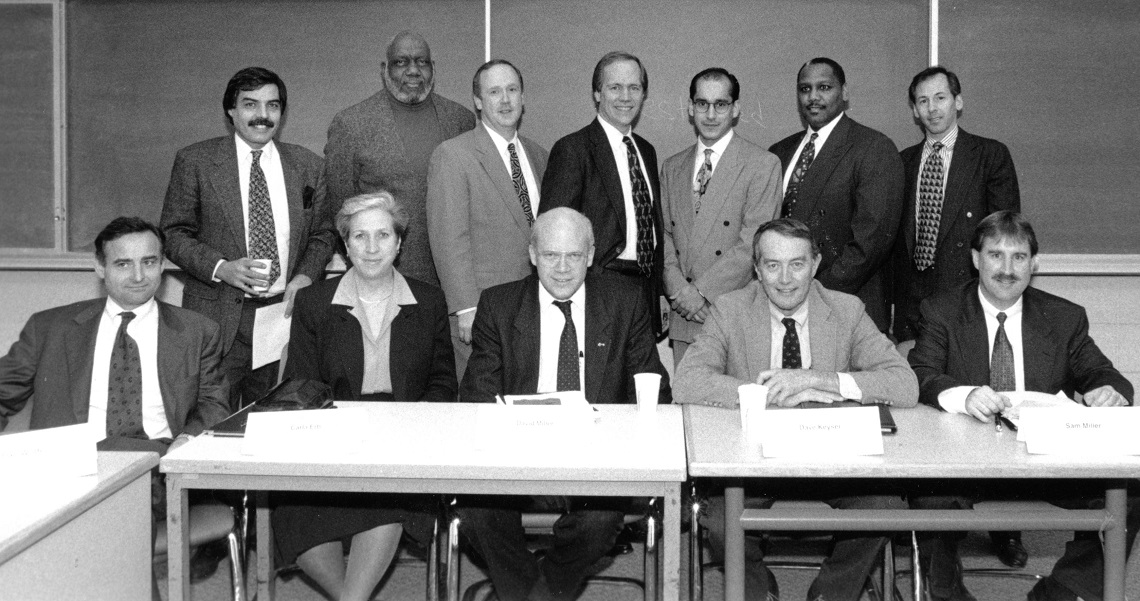
Spratlen (back row, second from left) served on the advisory board of the Consulting and Business Development Center from its founding.
“Thad’s greatest contribution was normalizing and promoting the pedagogical approach that public business schools need to be engaged with the community,” says Verchot, who continues to lead the center in its 26th year. “The center is the embodiment of who Thad is. For 26 years, every major decision about this center was done in consultation with him.”
With Spratlen’s sage counsel, the Consulting and Business Development Center has grown almost exponentially over the past 25 years. Through student consulting and faculty-led management education programs, the CBDC has dramatically accelerated the growth of small businesses owned and operated by people of color, women, LGBTQ+ and those located in underserved communities across the state of Washington. How dramatically? Center-supported businesses have generated more than $250 million in new revenue—at an annual growth rate more than double the state average—and created or retained more than 225,000 jobs since its founding.
In 2016, the center extended its growth acceleration efforts to cities across the United States through its Ascend network, which grows businesses owned by people of color through its proven model: addressing systemic lack of access to management education, money (loans and investment) and markets (to reach new customers and enterprise clients). Ascend is a partnership with JPMorgan Chase, which has invested $13 million in the initiative, including a recent commitment of $8 million to help grow 500 small businesses owned by people of color into multi-million-dollar firms.
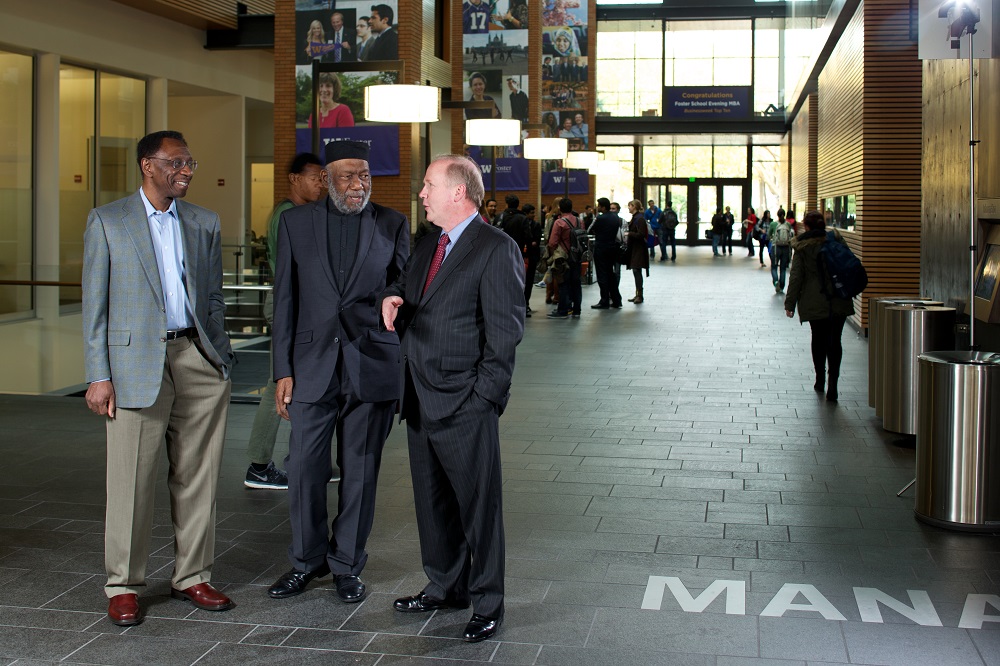
Consulting and Business Development Center founders Bill Bradford, Thad Spratlen and Michael Verchot.
Spratlen’s wisdom was an asset to the very end.
“I spoke with Thad last just ten days ago,” adds Verchot. “And the conversation was about where we’re going next and what more can we do to build a just world. I take that as my charge going forward.”
Lives of service
The spark of a humble inspiration that grew into a nationwide movement, Spratlen remained an essential presence at the center and the Foster School across the decades.
In truth, the Spratlens—collectively—were an essential presence. After they married, Lois Price Spratlen, with a master’s degree in mental health nursing, earned her PhD in urban planning. She leveraged her degree and nursing experience to tackle community issues of equity in public health. Eventually she became a professor of psychosocial and community health nursing at the UW. She was also the first woman, first professional nurse and first African American to serve as UW ombudsman and was inducted into the Washington State Nurses Association Hall of Fame in 2006 before her passing in 2013.
Meanwhile, Thad served as associate and acting director of Afro-American Studies (1980-1982) at the UW and as legislative representative to the Faculty Senate (1992-1993). At Foster, in addition to his long commitments to the CBDC and ABBS, he received the Dean’s Citizenship Award (2004) and two Andrew V. Smith Faculty Development Awards (1993, 1999).
The Foster School will further honor Spratlen inside Founders Hall, the privately funded $75 million state-of-the-art facility scheduled to open in spring of 2022. Situated prominently among the classrooms, team rooms, centers, career services and event spaces will be a special community gathering space to be called the Spratlen Lounge for Inclusion and Diversity.
“Thad’s legacy will live on each and every day at the Foster School through the Spratlen Lounge for Inclusion and Diversity, which will honor his career and contributions for generations to come,” says Dean Hodge.
Beyond the UW, Spratlen served as vice president of the ACLU of Washington and board president of the Jacob Lawrence Catalogue Raisonne Project. He co-founded the Caucus of Black Economists (which became the National Economic Association) in 1975. He received the Frederick Douglass Scholar Award from the National Council of Black Studies. And, for championing efforts of The PhD Project to increase representation of minority faculty across the business disciplines, Spratlen was awarded by the organization for lifetime achievement in 1997 and enshrined in The PhD Project Hall of Fame in 2018.
Even better together
Despite their remarkable solo achievements, the secret power of the Spratlens was their unbreakable bond, their lifelong partnership. It multiplied and amplified their individual powers of the positive. Together, they created the Lois Price Spratlen Foundation to support the development of nursing leaders. And they gave more than $1 million to the UW and Foster School over their lifetimes—much of it endowing a fund that supports student consulting at the Consulting and Business Development Center and ensures its vital work will continue for generations to come.
They’ve also done solid work on their own generations-to-come. The Spratlens’ greatest legacy resides in their five children, whom they raised with the same pursuit of excellence that Thad’s father had preached to him in the depths of the Depression in the segregated south.
Pamela L. Spratlen has served as the US ambassador to Kyrgyzstan and Uzbekistan; Townsand Price-Spratlen is an associate professor of sociology at Ohio State; two-time Olympian Pat Spratlen Etem is a public health community organizer and a mother of three; Paula Spratlen Mitchell is a high school teacher, tennis and volleyball coach and mother of two; Khalfani Mwamba is a clinical social worker, lecturer in the UW School of Social Work and a father of four.
Thad and Lois Spratlen were the UW’s pride and joy.
This point may be apparent to anyone who strolls through the Husky Union Building and notices the striking mural portrait depicting everyday and extraordinary champions of Civil Rights, from Black nurses and students of color to Dr. Martin Luther King, Jr.
At the center of everything—just as they were throughout their remarkable lives—are the Spratlens.
“It is an uplifting experience to receive and share this honor in the name, memory and spirit of Lois Price Spratlen,” said Thad Spratlen at the mural’s unveiling in 2016. “If she were present, you would have heard, ‘This is over the everlasting top!’ I want to thank every one of you who helped us get to the top.”
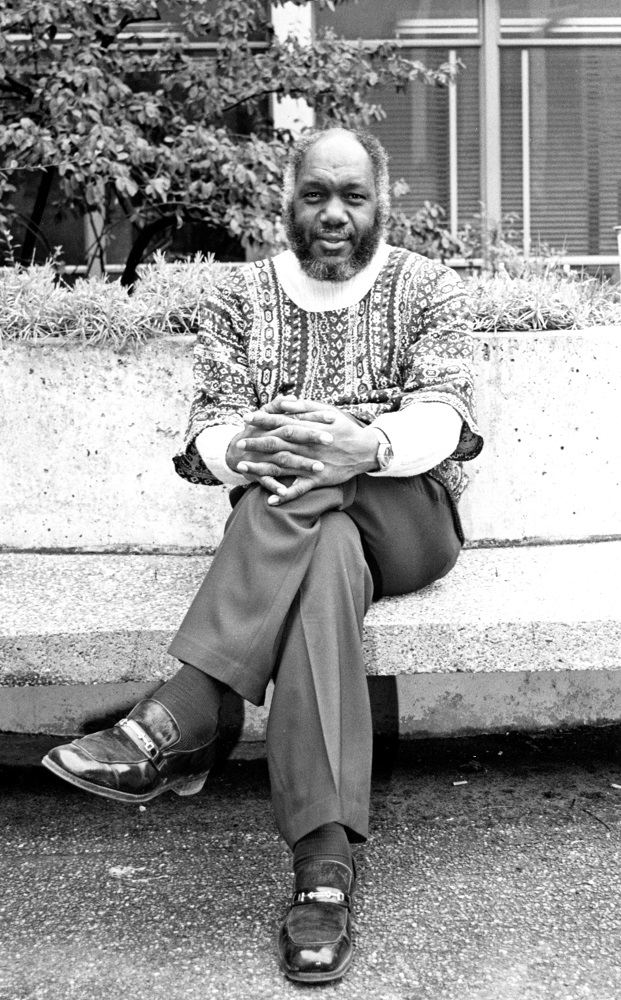
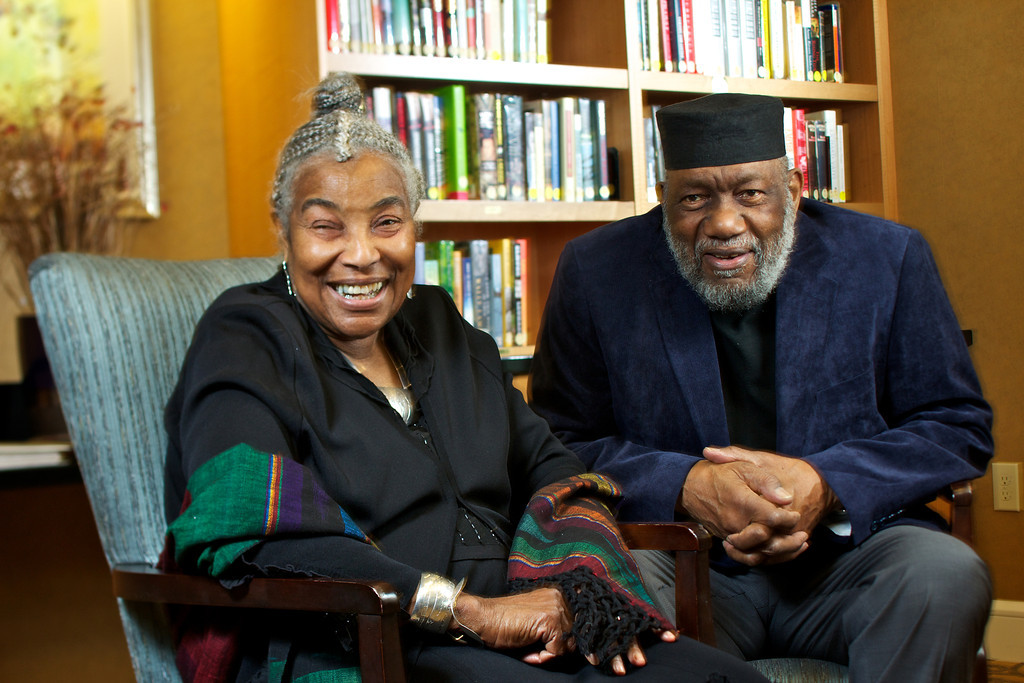
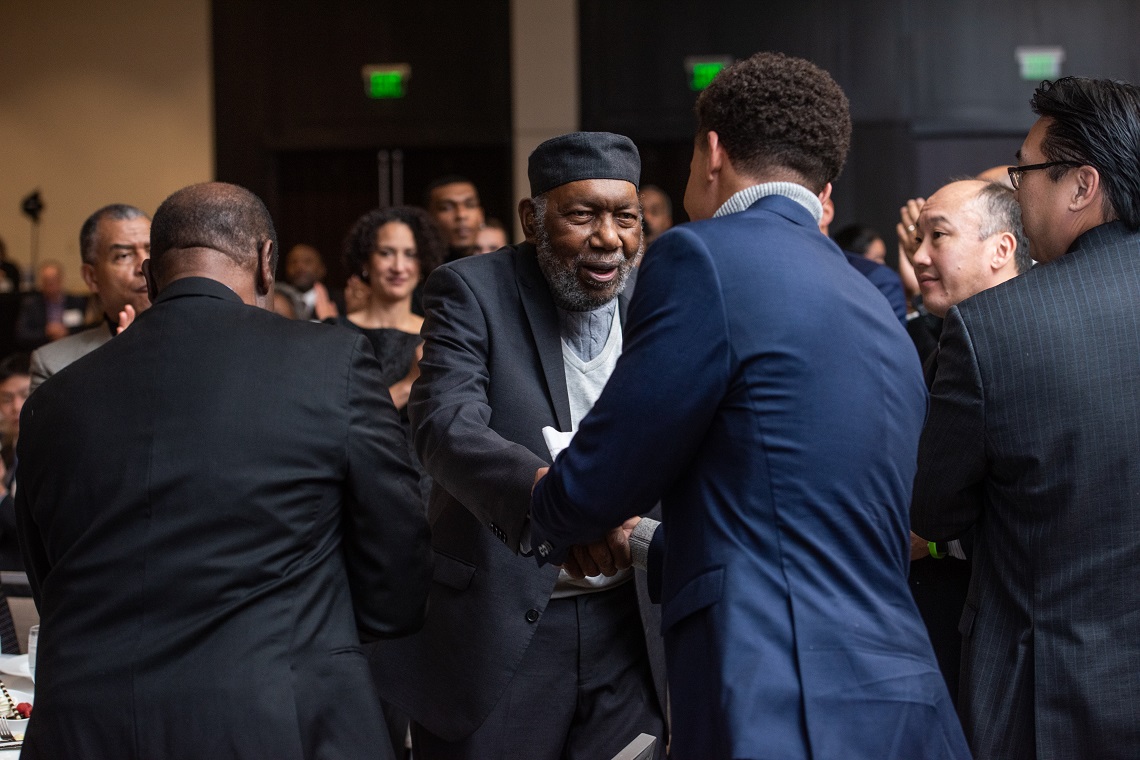
No comments:
Post a Comment
Note: Only a member of this blog may post a comment.